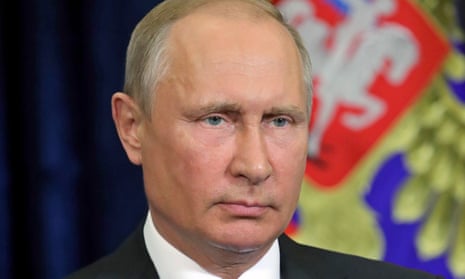A weak Vladimir Putin would be a bigger threat to world peace than the strongman he is, according to one of the UK’s most senior military figures.
Gen Sir Adrian Bradshaw, a former director of the SAS and until last year Nato’s deputy supreme allied commander in Europe, made the comments at the Hay literary festival in Wales, where he was talking about defence and security challenges.
Bradshaw, now retired, said the Russian president was much more dangerous weak than strong. He added: “At the moment his domestic popularity is huge – the envy of western politicians. This combination of painting a picture and then presenting himself as the answer to it works very very well.
“When things get really dangerous is if he is about to fall off his perch, particularly if it looks nasty. If it becomes existential for him, he could make it existential for us. By which I mean he could take risk on something which could slide into conflict.
“This is a terrible scenario that happily is unlikely, but because it is just possible we’ve got to respond to it.”
Bradshaw said Russia was stirring things up in the Balkans to thwart attempts by some of those countries to be part of the European Union.
In Bulgaria, 10% of the population is Muslim and there has not been a problem between Muslim and Christian communities. “They got on famously,” he said. “Recently, Russian money has been stirring things up. We’ve seen extremist orthodox Christian groups going in to mosques, trashing prayer rolls, causing trouble.”
The poisoning of the former spy Sergei Skripal and his daughter in Salisbury, England, was incredibly serious, he said, but should not be seen as surprising.
“We’ve heard Mr Putin himself suggesting that people who betray the Russian state are legitimate targets. The behaviour is characteristic. The disinformation has changed somewhat in recent years. The new Russian way of disinformation is to fill the information domain with so much stuff that you just can’t appreciate what is right or wrong and where it is coming from.”
He read from the list of 30 explanations given by the Russian state or its media outlets for the poisoning, from accidental exposure, to Porton Down, to accidental overdose, to it being a British attack, to it being the mother-in-law to be.
On Syria, Bradshaw said Russia’s support of Bashar al-Assad had allowed Putin to present himself as “an international leader with clout”.
On a more practical level, it had allowed Russia to base “all manner of stuff” in Syria, including anti-aircraft missiles and “missiles with reach for other other purposes”. Moscow also now had a Mediterranean base for fleet and aircraft.
Bradshaw said Russia was better militarily as a result of Syria. “They have watched us practising for the last couple of decades in Iraq and Afghanistan, particularly precision strikes with aircraft, the use of submarine-based ballistic missiles. They have done it all for real and are pretty much better at it as a result.”
Bradshaw said the solutions for many of the challenges were “holistic” and dialogue was vital – “taking every opportunity to reach out, to find common ground, to finally go back to the rules-based order, which is so important to our prosperity.”
